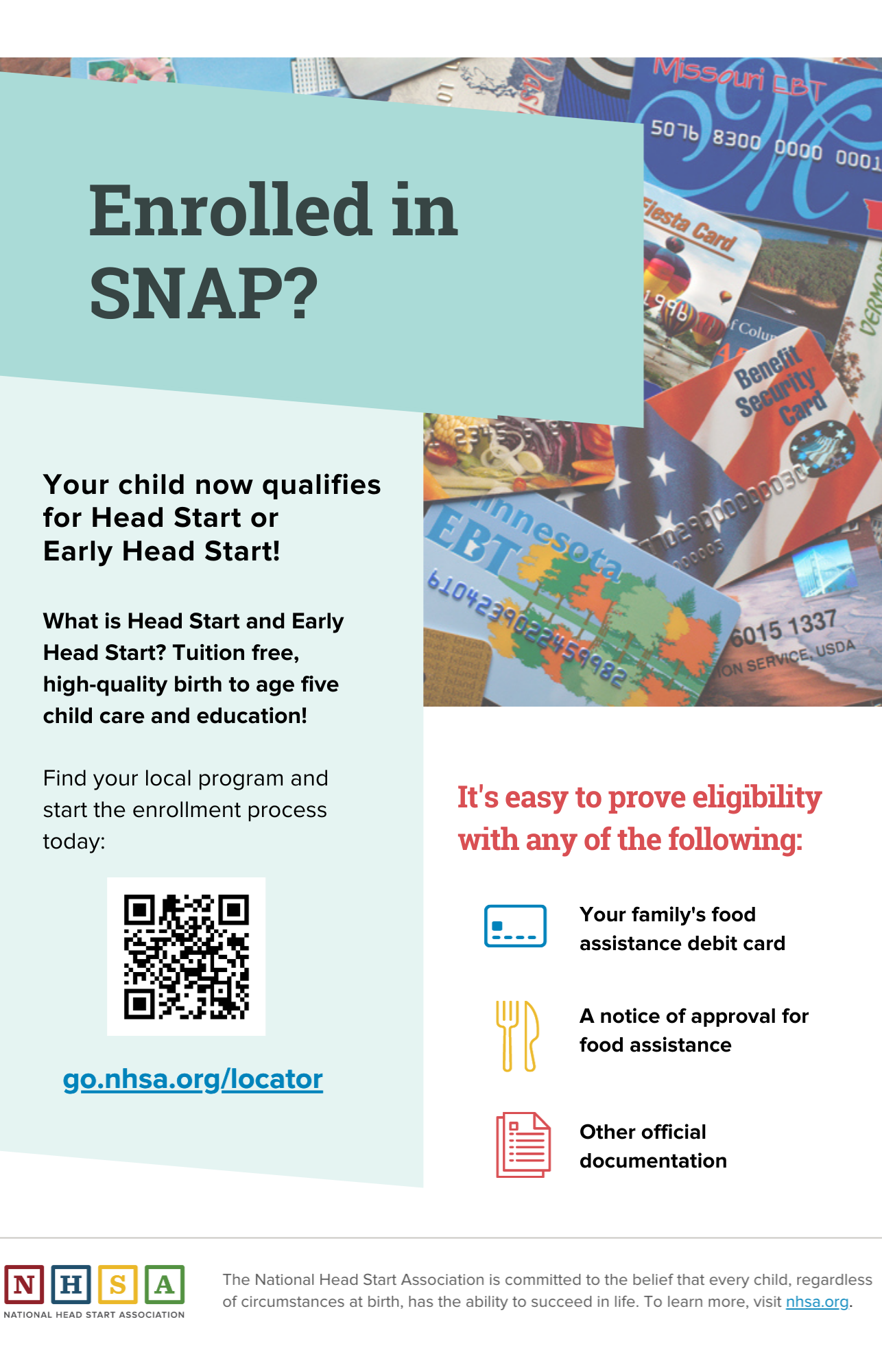Maine's Head Start State Collaboration Office (HSSCO) is located in the Department of Education as part of the Early Learning Team and is funded through a federal grant from the Office of Head Start, Administration for Children and Families, U.S. Department of Health and Human Services.
Since 1990, the Office of Head Start has supported collaboration through grants to States to create greater visibility of Head Start at the State level, leading to the development of multi-agency and public/private partnerships that enhance early childhood services for low-income and other at-risk children and families.
Head Start-State Collaboration Offices are guided by four priority areas established by the Office of Head Start (OHS):
1. Collaborate with state systems to align early care and education services and supports for children and families prenatally to age 5.
Collaborate across systems to support:
- Health, mental health, and social and emotional well-being
- Home visiting
- Comprehensive service delivery
- Services and supports for children who are experiencing homelessness, children in foster care, children with disabilities, and children who are dual language learners
- Quality improvements
- School readiness initiatives
- State background check systems
- Child care
- Child welfare
- Early Head Start-Child Care Partnerships
- Early Childhood Comprehensive Systems Health Integration Prenatal-to-3 Programs
2. Work with state efforts to collect and use data on early childhood programs to guide decision-making and improve child and family outcomes.
Support appropriate access to and use of data to guide decision-making and to improve outcomes in areas such as coordinated eligibility and disparities in access to services.
3. Support the expansion of and access to high-quality workforce and career development opportunities for staff.
Work with state professional development systems, including workforce registries and career pathways, and with institutions of higher education to promote expansion and high-quality career development opportunities.
4. Coordinate with school systems to ensure continuity and alignment across programs, as appropriate.
Promote continuity of services, program alignment, and support for successful transitions, particularly with state preschool, kindergarten, and with Title I, McKinney-Vento, and Individuals with Disabilities Education Act programs.
HSSCOs are also guided by priorities specifically related to their state and region per the Head Start Act in order to “facilitate collaboration among Head Start agencies and entities that carry out activities designed to benefit low-income children from birth to school entry, and their families (Sec. 642(B)(a)(2)(A))." They provide structure and a process for OHS to work and partner with state agencies and local entities to leverage their common interests around young children and their families to formulate, implement, and improve state and local policy and practices."
The Office of Head Start recognizes that States play an important role in the formulation and implementation of policies and initiatives that affect low income children and their families. As such, the Head Start State Collaboration Office and its connection to education in the State is viewed as vital to such policy development and application.
Learn more about the work of Head Start Collaboration Offices through our National Head Start Collaboration Office Brief.
What is Head Start?
The premise of Head Start is simple: every child, regardless of circumstances at birth, has the ability to reach their full potential.
What are the components of a Head Start program?
Head Start takes a comprehensive approach to meeting the needs of young children. There are four major components to Head Start:
- Education: Providing a variety of learning experiences to help children grow intellectually, socially, and emotionally.
- Health: Providing health services such as immunizations, dental, medical, and mental health, and nutritional services, and early identification of health problems.
- Parent Involvement: Involving parents in the planning and implementation of activities. Parents serve on policy councils and committees that make administrative decisions; participate in classes and workshops on child development; and volunteer in the program.
- Social Services: Provide outreach to families to determine what services they need.
The Early Head Start program (established in 1994) is the companion program created to address the same needs of children birth to age 3, expectant mothers, and their families.
The Head Start Advantage
What makes the whole child and whole family model so powerful? Nobel-prize winning economist James Heckman has suggested that the social-emotional development cultivated by programs may be the true contributor to long-term impacts, and health benefits which range from decreased child mortality to adult health behaviors. Likewise, by helping families who are struggling with poverty and other socioeconomic challenges to achieve their goals for education, employment, and housing, Head Start plays a transformative role across two generations. The Head Start Advantage is the individual opportunity to thrive in a safe, stable, nurturing space that puts children and their families on the path to success in school, in work, and in life.
Head Start Public PreK Partnerships
All 11 Maine Head Start grantees have at least one partnership with their local public school system, with a total of 44 SAU partnerships throughout Maine designed to help provide high-quality early education and additional support services for Maine children and families.

Public Annual Snapshot Reports:
Contact
Stacie McCoy
Maine State Head Start Collaboration Director
Phone: 207-816-2334
Email: stacie.mccoy@maine.gov